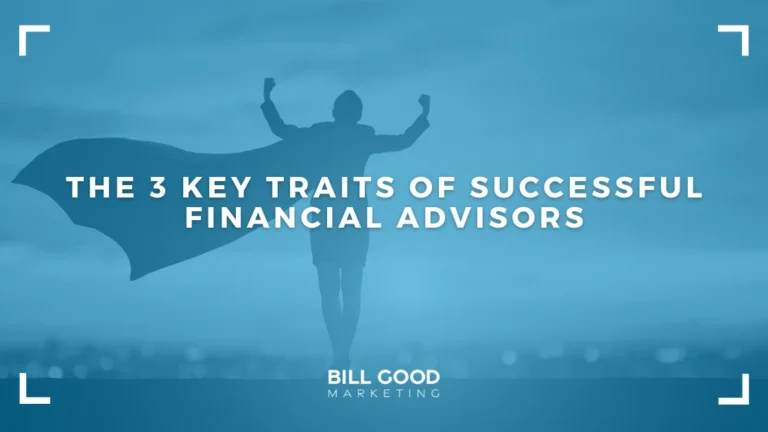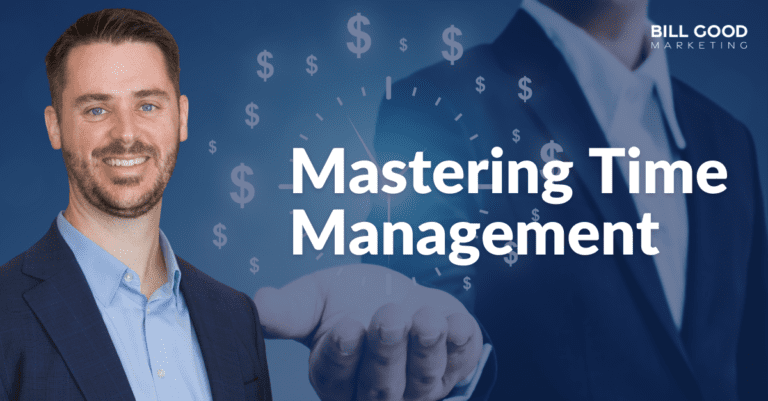A financial advisor sits at their desk, staring at a calendar packed with back-to-back meetings. Client reviews, financial planning sessions, a quick call with a CPA about tax planning, and somewhere in between—figuring out how to bring in new clients without losing momentum.
It’s a balancing act. And most advisors drop the ball.
The top successful financial advisors? They don’t just work harder—they work smarter. They follow a structure. A rhythm. A system that ensures they grow, serve, and scale without burning out.
They build a financial advisory business that runs like a well-oiled machine, not a never-ending hamster wheel.
All successful financial advisors have three key traits in common:
- They build a team so they can focus on what truly matters—meeting client needs, crafting personalized investment management strategies, and guiding their client base toward long-term success.
- They structure their time with a Model Day, eliminating distractions and making every hour count.
- They never stop prospecting, ensuring a steady flow of prospective clients and avoiding the all-too-common feast-or-famine cycle.
These aren’t optional skills. They’re the difference between a good financial advisor and a great one. Between an advisor who scrapes by and one who dominates their market.
In this article, we’ll break down these three traits, show you how to implement them, and explain why the best RIAs and investment advisors swear by them.
Let’s dive in.

Trait #1: Successful Advisors Build a Team
A financial advisor who tries to do it all alone is like a chef running a five-star restaurant… while also waiting tables, washing dishes, and managing the books.
It’s a recipe for burnout.
The best successful financial advisors, especially those with the CFP® designation, know that financial planning, investment management, and estate planning aren’t solo acts. They build a team that allows them to focus on what they do best—helping clients reach their financial goals while their support staff handles everything else.
The Right People, The Right Roles
You wouldn’t ask a portfolio manager to handle scheduling, just like you wouldn’t ask your RIA operations assistant to design a tax-efficient investment strategy. Every person on your team should have a role that plays to their skill set.
- A paraplanner to handle research and prep work.
- A client service associate to manage paperwork and onboarding.
- A business development specialist to keep new clients coming in.
The right team doesn’t just free up your time—it multiplies your impact.
Delegation is a Growth Strategy
Many financial advisors hesitate to hire because they think, “No one can do this as well as I can.” And they’re right. At first. But the goal isn’t perfection—it’s leverage.
By delegating, advisors can focus on high-value tasks: delivering financial advice, refining investment portfolios, and strengthening client relationships.
And just as importantly, delegation gives advisors more time for selling—more time with interested and qualified prospects. (Something our founder, Bill Good, preached for years!) Don’t get buried in admin work. Don’t relegate your work to being just a financial analyst. Advisors should spend their time building relationships, making connections, and driving growth.
A CERTIFIED FINANCIAL PLANNER™ who spends hours on paperwork isn’t growing. But one who spends their time meeting with business owners, high-net-worth individuals, and prospective clients is on the path to real success.
From Advisor to Leader
The transition from a basic investment advisor to a successful advisor isn’t about getting better at spreadsheets. It’s about leading a team. Setting expectations. Building a culture that keeps the whole operation running smoothly.
The financial advisors who embrace this shift? They don’t just grow their book of business. They create a firm that runs without them, giving them the freedom to focus on what really matters—whether that’s scaling, stepping back, or spending more time with family.
Once you have a team in place, the next step is making sure you’re using your time wisely. In the next section, we’ll break down how the best advisors structure their day, ensuring they stay focused, productive, and always moving forward.

Trait #2: Successful Advisors Manage Their Time Perfectly
A financial advisor has 24 hours in a day, just like everyone else. But some advisors build thriving practices with an ever-growing book of business, while others struggle to keep up.
The difference? How they spend their time.
A successful financial advisor doesn’t wake up and think, “What should I do today?” They already know. Their schedule isn’t random—it’s engineered for success using tried-and-true time management techniques.
Time Blocking: The Power of Predictability
Great financial advisors don’t let their day get hijacked by endless emails, paperwork, or client calls. Instead, they time block—dedicating specific hours to high-value activities.
- Mornings for Prospecting: The first few hours of the day are gold. They’re spent on prospecting, reaching out to new clients, and nurturing relationships with potential clients.
- Midday for Client Meetings: Whether it’s a wealth strategy review or a quick check-in, these meetings are structured and purposeful. They focus on solving problems, setting new goals, and deepening trust.
- Afternoons for Follow-Ups and Strategy: A great financial planner ensures their recommendations align with their client’s evolving financial situation. This is the time to refine investment portfolios, review tax strategies, and prepare for upcoming conversations.
By structuring their day around these priorities, successful advisors don’t just “get things done”—they move the needle on their business.
The 80/20 Rule: Focus on What Matters
Not all tasks are created equal. Some drive revenue and business growth, while others are distractions.
A good investment advisor knows that 80% of their success comes from 20% of their efforts. That’s why they focus on:
- Meeting high-value prospects instead of chasing low-quality leads.
- Refining investment strategies instead of micromanaging operations.
- Strengthening relationships with top clients instead of handling minor admin work.
They delegate everything else. Social media? Handled by marketing. Scheduling? Managed by an assistant. Paperwork? Offloaded to support staff.
This ensures that their time is spent on the things that truly drive business growth.
Avoiding Time Traps
Without a clear structure, it’s easy to fall into the time traps that keep so many advisors stuck.
- Over-servicing unprofitable clients – Not every client fits the ideal client base. Financial professionals must set boundaries to ensure they’re focusing on the right type of client.
- Getting lost in research – Deep diving into mutual funds and market trends is important, but advisors need to balance learning with action.
- Too much time on LinkedIn & social media – Yes, these are great tools for networking, but they shouldn’t replace actual client interactions.
The best advisors track their time, analyze their results, and adjust their schedules accordingly. They don’t just “work hard”—they work smart.
Success Leaves Clues
If you study successful advisors—the ones with a proven track record—you’ll notice they aren’t busier than everyone else. They’re just focused.
They know their clients’ needs, they prioritize relationships over admin work, and they ensure that every hour of their day is moving them toward their financial goals.

Trait #3: Successful Advisors Never Stop Prospecting
The biggest mistake a financial advisor can make? Thinking prospecting is optional.
The best advisors don’t wait for their book of business to shrink before they start looking for prospective clients. They don’t treat growth as a one-time project, a seasonal effort, or something they’ll “get to later.”
They understand that financial planning isn’t just about managing money—it’s about managing opportunity. And opportunity doesn’t knock. It has to be built.
That’s why the most successful financial advisors treat prospecting like breathing.
It’s constant. Automatic. Essential.
And they don’t rely on just one method.
Because if there’s one thing Bill has said for years, it’s this: You can’t rely on just one source for growth.
Two Primary Prospecting Strategies for a Successful Financial Advisor
1. Relationship Marketing & Referrals
Some advisors sit back and hope clients will refer them.
Top advisors engineer it.
They don’t “ask for referrals.” They create an environment where referrals happen naturally. They make it easy for clients to introduce them to friends and family—not because they’re desperate, but because they’ve positioned themselves as the trusted authority on investment advice, financial planning, and long-term security.
Here’s what that looks like in action:
- They build relationships with business owners who need strategies for retirement planning, tax planning, and business succession.
- They educate, rather than sell—offering in-depth guidance that makes their expertise impossible to ignore.
- They take time to understand each client’s financial goals, tailoring advice that proves they aren’t just another advisor—they’re a strategic partner.
- They know their client base inside and out, which means they know exactly how to attract more clients like them.
And the result? A steady flow of high-quality referrals—not from asking, but from earning.
2. Scalable Mass Marketing
Some advisors rely entirely on referrals. That’s a mistake.
Because relying on one method to grow is like betting your entire investment portfolio on a single stock.
Top financial advisors build scalable systems that bring in potential clients while they sleep.
They leverage:
- Seminars that position them as the go-to expert for personal financial advisors, investment advisors, and everyday investors.
- A presence on social media, where they share insights on wealth management, estate planning, and long-term financial security.
- Educational content that attracts high-net-worth individuals and guides them toward making informed decisions.
- Strategic digital marketing—because the right content, at the right time, turns a stranger into a CERTIFIED FINANCIAL PLANNER™ designee’s next best client.
The most successful advisors understand that fiduciary responsibility isn’t just about managing assets—it’s about making sure the right people find them in the first place.
Why Diversifying Prospecting Methods Matters
A successful financial advisor doesn’t gamble on a single marketing channel.
Some types of clients come through word-of-mouth. Others do their own research before making a decision. Some need an in-person connection, while others are drawn in by compelling digital content.
That’s why top advisors do it all.
They refine their skill set—learning how to navigate both one-on-one networking and large-scale marketing. They measure their success, track results, and optimize their outreach.
And over time, they build a track record of consistent, unstoppable growth.

The Difference Between an Average and a Successful Advisor
What separates the best from the rest?
It’s not intelligence—plenty of brilliant people struggle in the financial industry every year.
It’s not luck—if luck were the key, we wouldn’t see the same successful financial advisors rising to the top year after year.
It’s strategy. It’s discipline. It’s doing the right things, the right way, day in and day out—until success isn’t a possibility, but a certainty.
The top financial advisors? They engineer success.
They don’t just set financial goals—they build systems that ensure they reach them. They pursue designations and certifications like the CPWA® CFA® because expertise builds credibility. They refine their approach, constantly learning and adapting. They listen to every podcast, read every book, and invest in every financial advising resource that gives them an edge.
And they never stop prospecting.
The best advisors don’t rely on a single prospecting strategy. They diversify. They build multiple pipelines (we say you need at least four). They network. They create content. They speak at events. They establish strategic partnerships.
And most importantly?
They don’t do it alone.
For nearly 50 years, Bill Good Marketing has helped thousands of advisors build thriving businesses. Whether you’re just starting or looking to scale, we provide the systems, strategies, and content that turn potential clients into loyal ones, and new financial advisors into legends of the financial services industry.The next step is simple: Click here to learn how we can take your business to the next level.
About the Author

Andrew D. White is the Director of Marketing at Bill Good Marketing, a firm with over 45 years of experience helping financial advisors scale their businesses. With deep expertise in advisor marketing, client acquisition, and retention strategies, Andrew specializes in creating high-impact campaigns that drive measurable results. His insights are grounded in real-world experience, working alongside top-performing advisors to refine prospecting, branding, and practice management strategies.




